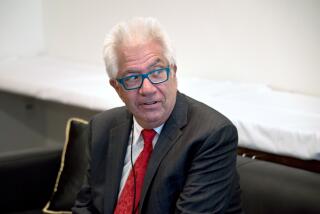The Prophet of Asia’s Future Power
UNITED NATIONS — Many voices claim to speak for Asia, but few are listened to, especially by the West. One of the exceptions to this rule, even among the most jaded European officials laboring at this tower of diplomatic Babel, is Kishore Mahbubani. Even after the overheated Asian values debate lost steam, when many of the region’s economies were themselves devalued, Singapore’s U.N. ambassador never lost his faith in the eventual return of Asia to its former stature. Now that Asia looks to be getting more or less back on its feet, Mahbubani looks more and more like a sage, continuing to sound a trumpet about the true value of Asia that he believes the West foolishly ignores.
Look beyond the obvious, he says--look to the future.
“Certainly, the long term trend is very clear, you cannot shake it,” he said, interviewed in his Eastside Manhattan apartment. “Sure, the Asian financial crisis was a stumbling block, but not necessarily a bad thing. There was too much Asian triumphalism. It was good to have our egos deflated and recover what I call our natural humility.”
Mahbubani also argued that there was too much deprecation of Asia in the West: “It’s absurd to say Asia might still succeed” when the continent is resplendent with “success stories from Japan to Taiwan to Hong Kong,” not to mention Singapore. What the region’s winners have done, he insisted, “other Asian societies will do. Maybe it will take 20 years instead of 10 years--it doesn’t matter. Asia is gradually recovering from centuries of slumber.”
Like many Asians, the ambassador sees China’s rise as unavoidable. His view of history is sweeping: “In the year 999, China was far ahead of any society in the world. Europe was still in the Dark Ages. If then you had predicted that China would remain as powerful for the next 1,000 years, you would have been wrong. Europe came, Europe overtook, Europe became the most important civilization for the next 1,000 years. History never stops, history keeps moving.”
The West, handicapped by orthodoxy and self-satisfaction, should be wary of unexamined assumptions, said Mahbubani, author of a book titled “Can Asians Think?” that is almost as coruscatingly critical of the East as the West. While he accepts that most societies will wind up with what the West calls a free media--because of technology’s inexorable march, more than anything else--he is dubious as to whether that is any magic cure. “The free press has become a sacred cow in American thought. It’s too bad people in America can’t honestly debate the good and the bad about their news media. Most people in the U.S. believe that when you have a free press, over time most major problems will disappear because some journalist will uncover the major problem, and so it will be taken care of.” If that were the case, he said, then all of the well-reported U.S. social problems--from the decline of public education to the rise of the rich-poor income gap to the alarming eclipse of the family structure--should have abated.
“In reality, some major social problems in the U.S. have grown worse, not better, in the last 30 years, despite all the press exposure. But since you have a free press, you assume you are dealing with these problems,” he said. “But you’re not, you’re just talking about them. I call the idea of the free press the opiate of the people.”
Singapore’s own press system, often described in the West as a kind of suffocating self-censorship, is not based on a U.S.-style gloves-off, adversarial approach but on a tacit partnership with the government that emphasizes domestic consensus-building, avoidance of disharmony and goal-sharing with the ruling elite. To be sure, Mahbubani, educated in Canada and Singapore as well as Harvard, is aware that lack of a free media is not without substantial shortcomings, “because you couldn’t get rid of bad rulers. But these days, whether you need to have an open press or don’t need to have it, is an irrelevant point. No society can remain closed. Technology alone will force societies open.” This powerful global trend, he said, will eventually moot Asia’s differences with the West over the media’s role.
Perhaps the ambassador’s chief quarrel with the West’s approach is its two-dimensional perspective. “In economic terms, the rest of us are still behind the West; but in social terms, many of the rest have societies that are more functional than the West, especially in terms of the family. Sure, politically, societies must move toward democracy; economically, societies must move toward free markets. But most Western societies assume that, having won all the great political and economic debates, that’s the end of the debate.” At least as important as economic achievement, he said, is true family stability. “This is where societies in Asia, with their traditional emphasis on the family, looking after children with two parents--maybe there’s a lot those societies can teach the West.”
For the last 200 years, he argued, the direction of worldwide idea-transmission has been a one-way street, from the West to the rest of the world. “But in the 21st century, the rest and the West, in the passage of ideas, will be a two-way street, not one-way.” The West must accept the instructional value of listening to the East, carefully, he warned. Cultural arrogance, either from the West or the East, can be fatally dysfunctional.
Times contributing editor Tom Plate’s column runs Wednesdays. The full text of the Mahbubani interview can be found at http//:www.asiamedia.ucla.edu.
More to Read
Sign up for Essential California
The most important California stories and recommendations in your inbox every morning.
You may occasionally receive promotional content from the Los Angeles Times.










